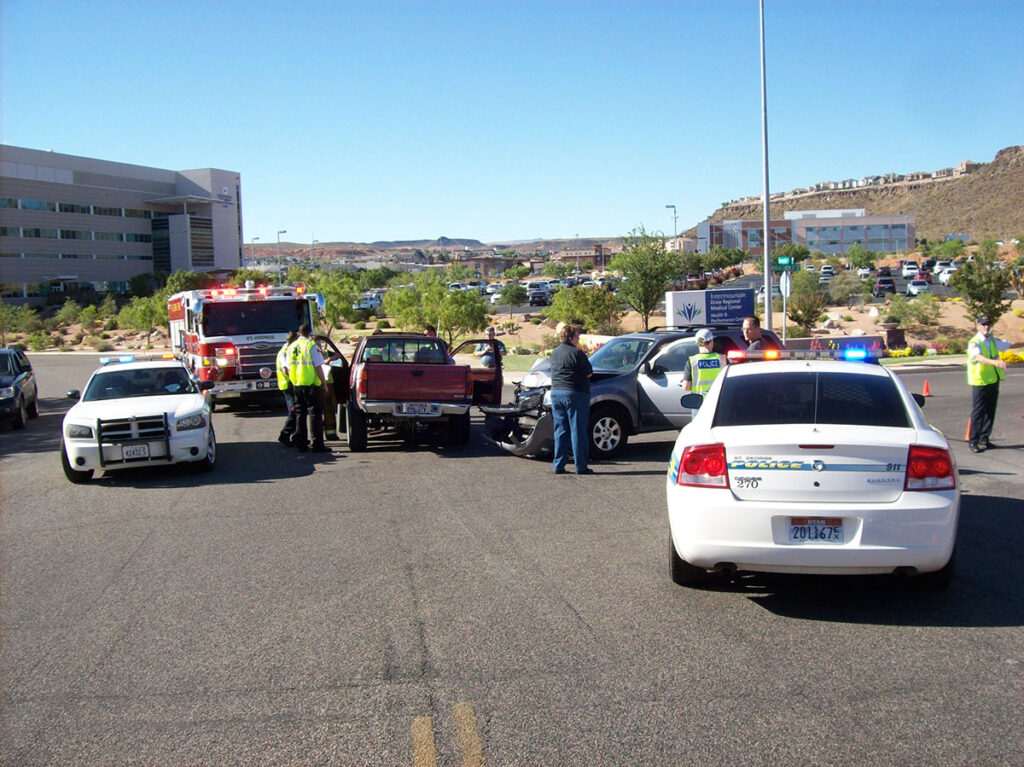Accidents can be unexpected, leaving us in a state of confusion and vulnerability. In this guide, we’ll walk you through what to do immediately after a car, truck, motorcycle, bike, or pedestrian accident. Whether you’re in St. George, Cedar City, Mesquite, the Arizona Strip, or the Gorge, understanding these steps is vital for your safety, well-being, and legal rights.
Immediately After the Accident
Get Out Of Immediate Danger
This may sound like a no-brainer, but if you have been in an accident and are in immediate danger – the car is on fire, or
Take A Breath
There are lots of thoughts that go through your mind when an accident happens. “What just happened?”, “Am I ok?”, “Are those in my car ok?”, “Is the other party ok?”, the list goes on.
- Unless you are in immediate danger, take a deep breath, do a self-assessment for injuries, and try to clear your mind a little bit before getting up.
Ensure Safety and Seek Medical Attention
Your safety and health as well as those who are with you come first.
- Check on the well-being of all parties involved
- If possible, move to a safe location.
- Seek medical care, even if your injuries seem minor. Immediate medical attention helps create a record for your personal injury claim.
Contact Law Enforcement
Once everyone is safe, it’s time to notify the authorities.
- Reporting the accident is essential, even in minor incidents. The police report becomes valuable evidence.
- Ensure you provide accurate and detailed information about the accident to law enforcement.
Do Not Admit Fault
It’s natural to feel overwhelmed, but it’s vital not to admit fault or make statements that could work against you. This includes when speaking to the other parties, speculation to the police, insurance companies, or any witnesses. Stick to the facts you know.
- Refrain from admitting fault or speculating about it. Understanding all the facts is crucial.
- While honesty with law enforcement and medical professionals is essential, avoid making premature judgments.
Gather Evidence and Information
Collecting evidence is key for building a strong case.
- Document the accident scene with photographs and videos.
- Exchange contact and insurance information with the other parties involved.
- If there were witnesses, gather their contact information.
Preserve Evidence
Don’t discard any physical evidence related to the accident.
- Keep damaged property, clothing, or objects relevant to the accident.
- Maintain your medical records and bills; they provide a clear picture of your injuries and related expenses.
In the Days Following the Accident
Notify Your Insurance Company
Promptly report the accident to your insurance company.
- Timely reporting is essential for the insurance claims process.
- Ensure you provide accurate and comprehensive information to your insurer.
Consult a Personal Injury Attorney
Consider consulting a personal injury attorney early in the process.
- An attorney can help protect your legal rights, assess the potential for a personal injury claim, and handle communication with insurance companies.
- Consulting an attorney soon after the accident can help ensure your legal rights are protected and your potential claims are assessed properly.
Be Cautious with Social Media
Your online presence can impact your personal injury claim.
- Be mindful of sharing accident or injury-related information or images on social media, as these can be used by opposing parties.
- Adjust your privacy settings to limit access to your personal information.
Conclusion
In the aftermath of an accident, your immediate and subsequent actions are crucial. They ensure your safety, protect your well-being, and lay the foundation for your legal rights and potential personal injury claims. If you’ve experienced an accident in St. George, Cedar City, Mesquite, the Arizona Strip, or the Gorge, give Injury Smart Law a call for a free consultation to see how we can help. A personal injury attorney can guide you through the complexities of the claims process, safeguard your rights, and help you build a strong case. Remember, your health and well-being are paramount, and knowing what to do after an accident is a vital step toward recovery.


